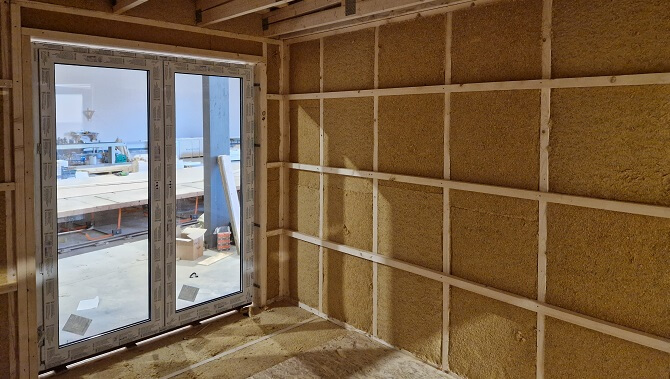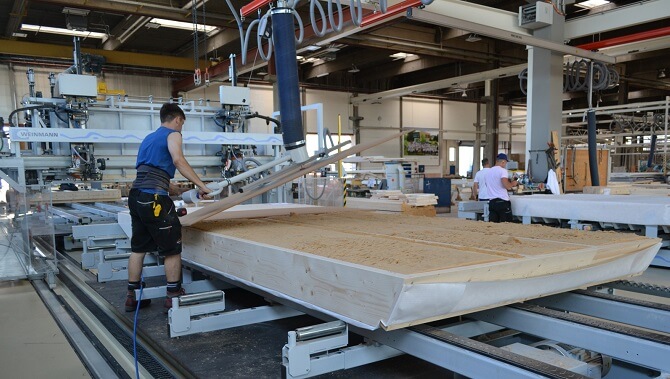Energy efficiency
NorgesHus wooden modular homes can be highly energy-efficient, combining the benefits of modular construction with the natural insulating properties of wood. Here are some aspects that contribute to the energy efficiency of wooden modular homes:

1. Insulation:
Wood has natural insulating properties, but additional insulation is also typically added to the walls, floors, and roofs of modular homes. This can help to minimize heat transfer, keeping the home warmer in the winter and cooler in the summer.
2. Air Sealing:
Modular homes are often better sealed than traditional homes, which can help to reduce drafts and air leaks. This can make the home more comfortable and reduce the amount of energy needed for heating and cooling.
3. Precision Construction:
Because they’re built in a controlled factory environment, modular homes can be constructed with a high level of precision. This can help to ensure that the home is well-insulated and that there are minimal gaps and cracks for air to leak through.
4. Energy-Efficient Design:
Many modular homes are designed to be energy-efficient, with features like double- or triple-glazed windows, high-efficiency HVAC systems, and energy-efficient appliances. Some modular homes are also designed to take advantage of passive solar heating, with large south-facing windows and carefully designed shading.
5. Sustainability:
Wood is a renewable resource, and many modular home manufacturers use sustainably sourced wood. Some manufacturers also use other sustainable materials, like recycled steel for the frame and recycled or low-VOC finishes.
6. On-Site Energy Production:
Some modular homes are designed to incorporate renewable energy systems, like solar panels or geothermal heating systems. These can help to reduce the home’s reliance on grid electricity and fossil fuels.
7. Less Waste:
The modular construction process produces less waste compared to traditional construction methods, as the materials can be precisely measured and cut in the factory. This not only reduces the environmental impact but can also result in cost savings.
Remember, not all wooden modular homes are created equal when it comes to energy efficiency. It depends on the design of the home, the materials used, and the construction process. If energy efficiency is a priority for you, be sure to discuss this with the manufacturer or builder when planning your home.
Wood has natural insulating properties, but additional insulation is also typically added to the walls, floors, and roofs of modular homes. This can help to minimize heat transfer, keeping the home warmer in the winter and cooler in the summer.
2. Air Sealing:
Modular homes are often better sealed than traditional homes, which can help to reduce drafts and air leaks. This can make the home more comfortable and reduce the amount of energy needed for heating and cooling.
3. Precision Construction:
Because they’re built in a controlled factory environment, modular homes can be constructed with a high level of precision. This can help to ensure that the home is well-insulated and that there are minimal gaps and cracks for air to leak through.
4. Energy-Efficient Design:
Many modular homes are designed to be energy-efficient, with features like double- or triple-glazed windows, high-efficiency HVAC systems, and energy-efficient appliances. Some modular homes are also designed to take advantage of passive solar heating, with large south-facing windows and carefully designed shading.
5. Sustainability:
Wood is a renewable resource, and many modular home manufacturers use sustainably sourced wood. Some manufacturers also use other sustainable materials, like recycled steel for the frame and recycled or low-VOC finishes.
6. On-Site Energy Production:
Some modular homes are designed to incorporate renewable energy systems, like solar panels or geothermal heating systems. These can help to reduce the home’s reliance on grid electricity and fossil fuels.
7. Less Waste:
The modular construction process produces less waste compared to traditional construction methods, as the materials can be precisely measured and cut in the factory. This not only reduces the environmental impact but can also result in cost savings.
Remember, not all wooden modular homes are created equal when it comes to energy efficiency. It depends on the design of the home, the materials used, and the construction process. If energy efficiency is a priority for you, be sure to discuss this with the manufacturer or builder when planning your home.
Some potential downsides to consider include limitations on design or size due to transportation constraints, potential stigma or misunderstanding about modular homes, and potential difficulties with zoning or building regulations in certain areas.
As with any home purchase or construction project, it’s important to do your research and consider your specific needs and circumstances.









